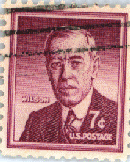FRtR > Outlines > American History (1990) > Chapter Seven > Isolationism follows peace (3/13)
An Outline of American History (1990)
Chapter Seven
Isolationism follows peace (3/13)
< Previous Page * Next Page >
It was Wilson's hope that the final treaty would
have the
character of a negotiated peace, but he feared that the passions
aroused by the war would cause his Allies to make severe demands. In
this he was right. Persuaded that his greatest hope for the peace of
the world, the League of Nations, would never be
realized unless he
made concessions to the Allies, he traded away point after point in
the peace negotiations at Paris. Some negative points Wilson did
accomplish: he denied Fiume to Italy, resisted Clemenceau's demand to
detach the entire Rhineland from Germany, prevented France from
annexing the Saar Basin, and frustrated a proposal to charge Germany
with the whole cost of the war.
In the end, however, there was little left of his positive
proposals for a generous and lasting peace but the League itself, and
Wilson had to endure the final irony of seeing his own country
spurn League membership. This outcome was partly due to his
own poor judgment at the time. He made the political mistake of
failing to take a leading member of the opposition Republican
Party to Paris on his Peace Commission, and when he returned
to appeal for American adherence to the League, he refused to
make even the moderate concessions necessary to win ratification
from a predominantly Republican Senate.
 Having lost in Washington, Wilson carried his case to the
people on a tour throughout the country. On September 25, 1919,
physically ravaged by the rigors of peace-making and the pressures
of the wartime Presidency, he suffered a crippling stroke at Pueblo,
Colorado, from which he never recovered. In March 1920, the
Senate in its final vote rejected both the Versailles Treaty and the
League Covenant. From this point the United States withdrew
deeper and deeper into a posture of isolationism. The idealistic
mood passed with Wilson, and an era of apathy followed.
Having lost in Washington, Wilson carried his case to the
people on a tour throughout the country. On September 25, 1919,
physically ravaged by the rigors of peace-making and the pressures
of the wartime Presidency, he suffered a crippling stroke at Pueblo,
Colorado, from which he never recovered. In March 1920, the
Senate in its final vote rejected both the Versailles Treaty and the
League Covenant. From this point the United States withdrew
deeper and deeper into a posture of isolationism. The idealistic
mood passed with Wilson, and an era of apathy followed.
In the presidential election of 1920,
Wilson's own party
nominated a man who had not been associated prominently with
the Wilson Administration, Governor James M. Cox of
Ohio. The
overwhelming victory of the Republican nominee, Warren
G.
Harding, was final evidence of the general repudiation of
Wilsonism. Although Harding had refused to commit himself clearly on
the League issue during the campaign, his foreign policy, and that
of his Republican successors, hewed generally to the isolationist
line.
This election was the first in which women throughout the
nation voted for a presidential candidate. During the war, Wilson
had championed a federal amendment to permit women to vote,
for their great contributions to the war effort had dramatized both
their civic capacities and their right to the ballot. In 1919,
Congress submitted to the states the Nineteenth
Amendment, which
was ratified in time to permit women to vote the following year.
< Previous Page * Next Page >
 Having lost in Washington, Wilson carried his case to the
people on a tour throughout the country. On September 25, 1919,
physically ravaged by the rigors of peace-making and the pressures
of the wartime Presidency, he suffered a crippling stroke at Pueblo,
Colorado, from which he never recovered. In March 1920, the
Senate in its final vote rejected both the Versailles Treaty and the
League Covenant. From this point the United States withdrew
deeper and deeper into a posture of isolationism. The idealistic
mood passed with Wilson, and an era of apathy followed.
Having lost in Washington, Wilson carried his case to the
people on a tour throughout the country. On September 25, 1919,
physically ravaged by the rigors of peace-making and the pressures
of the wartime Presidency, he suffered a crippling stroke at Pueblo,
Colorado, from which he never recovered. In March 1920, the
Senate in its final vote rejected both the Versailles Treaty and the
League Covenant. From this point the United States withdrew
deeper and deeper into a posture of isolationism. The idealistic
mood passed with Wilson, and an era of apathy followed.